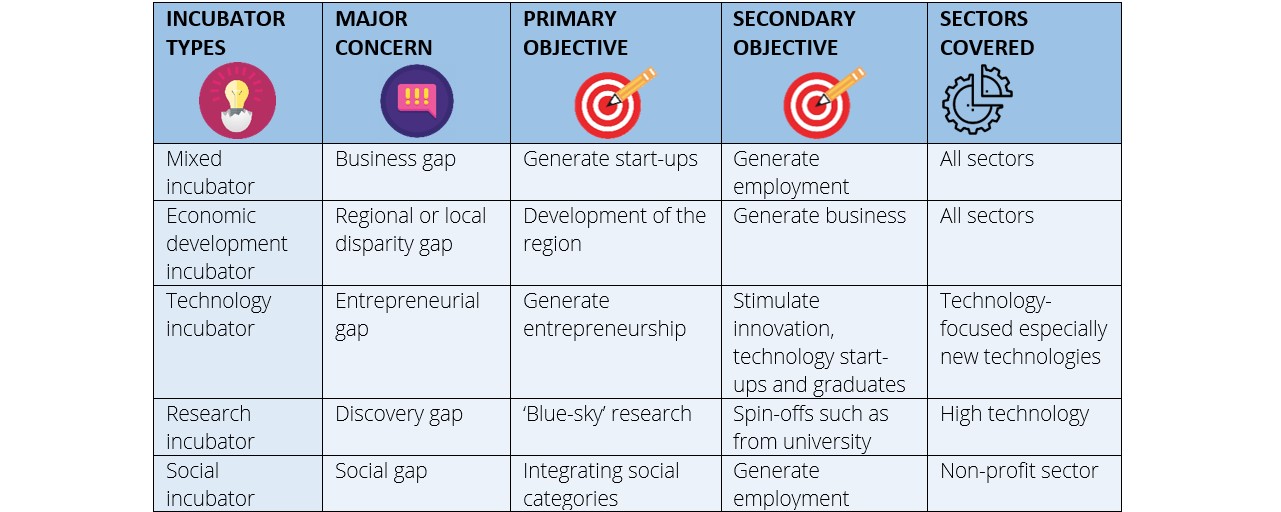Home » Session 1: Incubators and social innovation for sustainability
Introduction to Incubation for Sustainability Innovation
Session 1: Incubators and social innovation for sustainability
New companies often struggle for survival, incubation can drastically increase a company’s chances in its market, up to 90% three to five years post incubation, and is a central driver of innovation (Davalli, De Conick & Marengo n.d). An incubator is an “organisation dedicated to the support of emerging ventures” (Bergek & Norman 2008:21) and seeks to close the gap between the new venture’s idea and turning this idea into a reality.
Incubators can be classified depending on which gap the ventures they support intend to address. Table 1. outlines the different types of incubators, their areas of concern and main objectives.
Table 1. Types of incubators

Incubation for sustainability
Sustainability is a driver of social innovation (Fifka & Idowu 2013) and sustainable development initiatives utilise social innovation. Sustainable development implies a change in society in a specific way and so goes hand in hand with societal changes brought about by social innovations (Buchegger & Ornetzeder 2000).
There are, however, difficulties when looking to social innovations to solve social issues. Developing and implementing social innovations can struggle from a lack of funding and human resources, especially if they are reliant on government subsidies (Ishigaki & Sashida 2013, Buchegger & Ornetzeder 2000). Other difficulties include the context dependent nature of sustainable development projects that implement social innovations, market protectionism, risk aversion, problem complexity and access to networks (Buchegger & Ornetzeder 2000, Chalmers 2012). Social innovation incubators can help ventures overcome these challenges.
Social innovation incubators support the development and scaling-up of ventures that target social needs and challenges through innovative and market orientated solutions. They are generally stimulated by local communities and aim to produce their effect within a certain territory or locality (Casanovas & Bruno 2013, Pieri et al. 2020). Incubators with a sustainability specialisation support entrepreneurs who create businesses that benefit the environment by reducing or reversing negative environmental impacts (Côté & Cohen-Rosenthal 1998).
While the support and services that social innovation incubators offer are similar to conventional incubators, their mission and focus differs (Aernoudt 2004, Klofstein et al. 2020). Incubators that support social innovation for sustainability also possess several important features. The locality of the incubator is important, incubators need to be sensitive to local needs and the environment. This relates closely to the need for community connections, social incubators connect people and communities with common values and shared interests through a communitarian and collaborative approach.
Social innovation incubators must have a social orientation, so they must be in touch with the local community through a participatory and inclusive process. As such, it is also important that the incubatees and the incubator hosts share the incubators sustainability values and goals. This often forms part of the screening process when selecting incubatees (Nicolopoulou et al. 2015, Pieri et al. 2020). Social and human capital are also important as social capital is required for social interactions with stakeholders in achieving social innovations, it creates the bridge between incubation and the creation of social innovation (Nicolopoulou et al. 2015).

Continue to “Session 2: Stages of Incubation”
© 2022 Centre for Civil Society and Governance at The University of Hong Kong
Except where otherwise noted, contents of this e-study is licensed under a Creative Commons Attribution-NonCommercial-ShareAlike 4.0 License.
![]()


